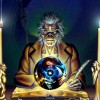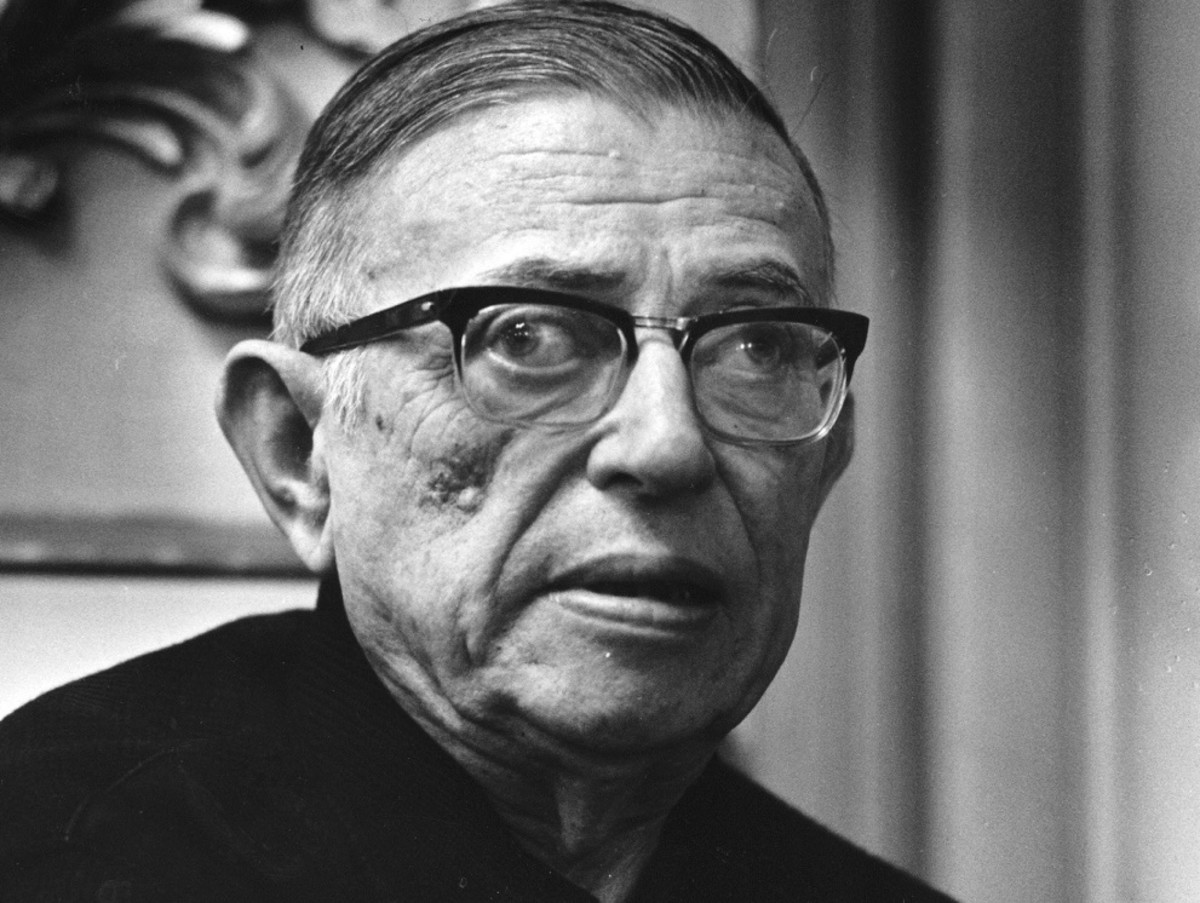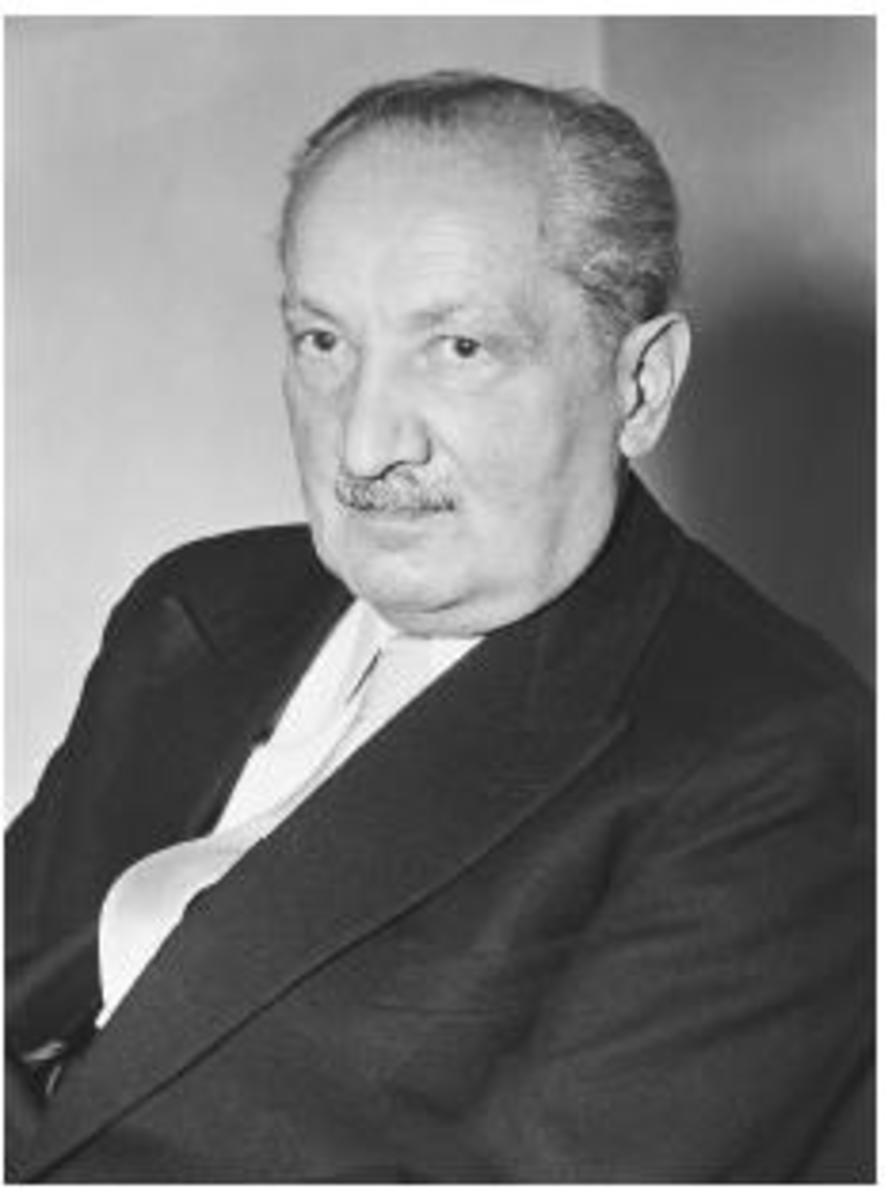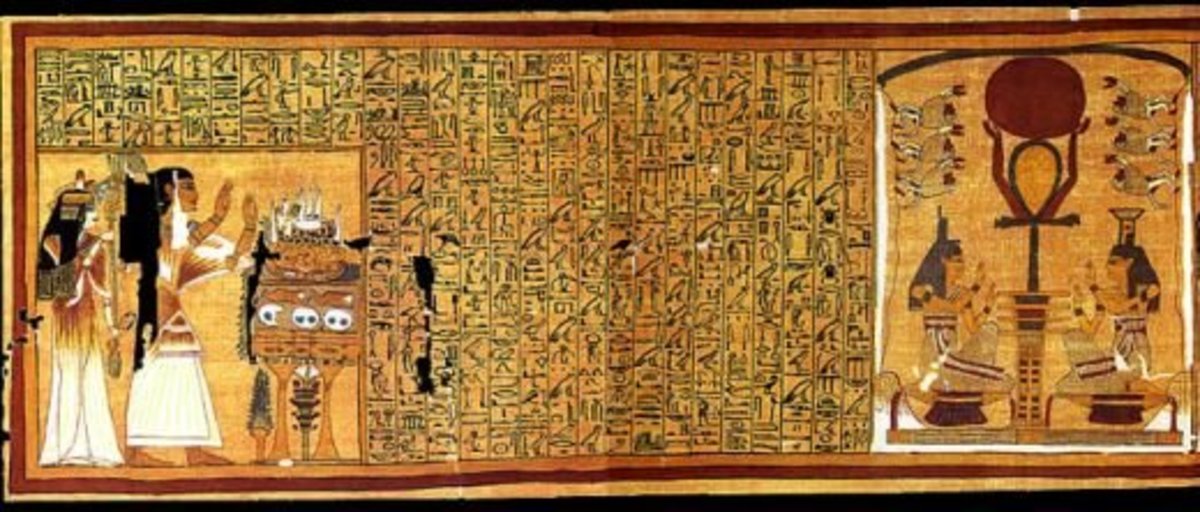ABSURDISM AND REBELLION: KIERKEGAARD AND CAMUS
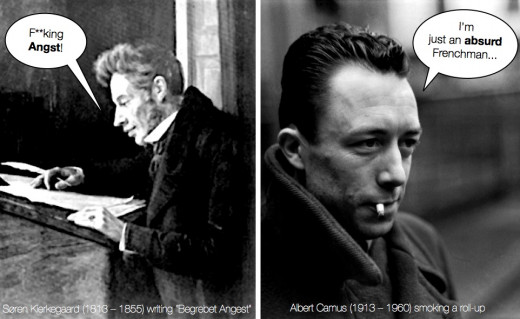
a. Paradox and faith
The concept of absurd was originally introduced to philosophy by Søren Aabye Kierkegaard, who argued that the absurd nature of the world is the reason to believe, to have faith, as he was paraphrasing an ancient Latin apotheosis credo qui absurdum – I believe because it is absurd, it is paradoxical. Here, absurd appears as a reference point for an act of faith which is an act of a total autro-destruction of reason. Reason (ratio) needs to be sacrificed, and it is not because we desire so, but because reason is completely powerless to describe the existence, no matter how hard it tries. Reason is impotent because of its “coldness” and inability to step into the sphere of personal interest, as it always tries to be “indifferent”. Kierkegaard understands interest as being interested in religion and being interested in the possibility of achieving subjective truth. Proving the existence of God is unnecessary in his case, and “Pascal’s Wager” is also not welcome here because it is a product of calculative mind and speaks of a certain compromise – and those are exactly the tools reason uses, while Kierkegaard proposes something new and different: he calls his philosophy pisteology, “philosophy of faith”, in which faith is completely separated from knowledge whether it is some kind of scientific knowledge, knowledge on religious practices or religion in general. As long as knowledge does not equate with “knowing” God it is worthless – and we cannot know God, as God cannot be “known” because he is, according to Kierkegaard, the only being which is oblivious of existence. God is pure essence. Volatile entities possess existence, while God, as the only omnipresent being, comprises of pure essence. That is why Karol Teplic, in his concise and pithy study about Kierkegaard, says:
“If man would be able to grasp the absolute truth, he would have also grasped the knowledge which excludes faith."
Since man is an incomplete being, he is as well dependent on his relationship with God, and that makes faith, as an instrument for maintaining that relationship, necessary. There is no prescribed method or a “how to” guide for “having faith”, as Kierkegaard rejects any kind of system, which also includes systems of belief proposed by organized religions. Appeal for faith is nothing more than call for simplicity and purity of heart, in accordance with the statement of Jesus Christ who said:
"Except you be converted and become as little children, you shall not enter into the Kingdom of God." (Mat. 18:3)
Although Christianity is, to a large degree, based on that statement, it seems that institutionalized religion had lost its taste for these words, and it also seems that Emmanuel Mounier is right when he says that Christianity possesses a certain “self-defense instinct” which helps him to get filled with life when it gets stale. Protestant reform, Kierkegaard’s philosophy of faith, or understanding of Christianity as an engaged religion – all those phenomena can boost new life into an old religion. Emphasizing the importance of the interior of human being had a great role in “preserving Christianity”, and Kierkegaard’s contribution was in concretizing that interior, thus contributing to the later emergence of philosophies of existence. Kierkegaard sees “a genuine man” as opposed to “an abstract thinker” which an archetype of a disinterested scientist who has no notion about himself as a being, who is prone to generalization and systematization. On the other hand, “genuine man” is an individual and unique existence, that must be a human being made of flesh and bones, who appears and lives in the world, but who also experiences that world. Still, question arises about the genuineness of that genuine man. Such a man is certainly not a thought concept, created for the purpose of sociological and anthropological research, and the question arises whether that genuine man is free, and whether it can be free, as description requires? One thing is certain: Kierkegaard surely had started something which will end up as one of the most important chapters in contemporary philosophy. Although his philosophy somehow neglects social nature of man, somehow passes by Aristotle’s zoon politikon, Kierkegaard tries to tell us that there can be something of great importance in the very interior. Discomfort of inner incompleteness can be surpassed either by suicide of by “the leap of faith”. Kierkegaard saw no other option, but one French author, Albert Camus, had seen it – the third, and the most lion-hearted option was: embracing the absurd.
b. Sisyphus’ circle
In his book The Myth of Sisyphus, Albert Camus develops the concept of absurd as seen from a perspective of an atheist. His absurd is pure, it is an unbearable circle. In the realms of absurd, all inner chattering halts, as inner dialogue has become obsolete and meaningless. Dwelling in the circle of causal determination, succumbing to that unfruitful circle of thoughts is necessary and unavoidable, but only until that circle becomes a perfect circle – as even an octagon or a figure with thousand angles have referencing points, but a perfect circle has none. Thus, all bordering points are equal, equally distanced from the centre of the circle. Camus argues that absurdity subordinates quality to quantity. By getting to know the absurd we have completed the circle, we have achieved perfection and now, all that is left is to maintain that perfect state, make it as lasting as possible, to “live” that absurd as long as possible because now we know that the quality of experience will always be the same – we have reached the peak of quality. We can name one example, and it concerns tobacco smoking. When we, in some moment, become aware that tobacco smoking doesn’t do us any good – it doesn’t help us get inspired, it doesn’t calm us down, it even doesn’t help us evoke some memories – and we still continue smoking, that’s when we have experienced the absurd state of mind as we participate in an absurd action. By continuing to do something with pure awareness of the futility of that action – that’s when we touch the absurd. Can living thus be called an absurd act? Camus argues:
“If this myth is tragic, that is because its hero is conscious. Where would his torture be, indeed, if at every step the hope of succeeding upheld him? The workman of today works everyday in his life at the same tasks, and his fate is no less absurd. But it is tragic only at the rare moments when it becomes conscious.”
Is life absurd, is it bared of meaning? Can we give life meaning, if life itself is so poor that it doesn’t possess its own? Yes, we can give life meaning, but only to our own life, not to life in general. And if we give our life meaning, where should we extract that meaning from? From religious scriptures, or various secular ideologies? Serving God and other people can make you a fanatic, living for your own good is considered to be utter hedonism, and although various dogmas are all around us and their words are soothing, those dogmas do not prepare us to face the world as it is, they do not prepare us for reality. And real world is, as its name might suggest, the world of things as they are (not necessarily as we see them, or think about them).
c. Towards the possibility of rebellion
Contemporary idols may have gotten to wear different clothes then those from Bacon’s era, and thus
“the back-face of thesis on failed certainty communicates with addition of a new Idol to standard Bacon’s list – the Idol of (Self -) Cognition,”
but we can win battles against this idol by establishing an absurd universe, full of uncertainties, where good equals evil, truth and lies have the same value, and the man who dwells in such an universe, an absurd man, positions himself above all opposites, “beyond good and evil” – as Nietzsche wrote. People say “know thyself and you shall know truth”, but knowing yourself is actually imposing limits upon yourself, identifying with yourself means putting limits on yourself, and that is exactly where freedom, as a way of existing in a boundless world, ceases to exist - even as a possibility. Only by constantly risking a faux pass, only by existing in this world as a total stranger will you be able to exist as a free man. Heidegger’s existential of throw-ness becomes exile in Camus’ works, the world becomes absurd and Plotinus’ statement on nostalgia being our wish to know the “back-side of things” evaporates into thin air, because in an absurd universe the front side is also the back side, ontological hierarchy vanishes, everything is unknown to a stranger, everything is new, he is not at home when he is amongst people, and neither the Universe can be called his home, as all possible and impossible boundaries disappear. The stranger is absolutely alone in this world, there are no referencing points, he is like a lump of crystallized consciousness dwelling in an infinite universe with no boundaries, uncertain of anything else then of its own existence, relating to the world with pure, active, crystallized awareness – and awareness is another name for that active, awoken, pure consciousness. Thus, we can escape the absurd, but the exit is not definitive, given once and for all, it needs to be replenished constantly. Rebellion is a way to escape the absurd, to affirm ourselves – and we can affirm ourselves only by saying “no” – because we are able to do only that. A rebel is the one who affirms himself by saying “no”, and paradoxically, his “no” in deed means “yes” – because “no” is said to external factors and influences, and “yes” is said to himself, his own being.
"When he rebels, a man identifies himself with other men and so surpasses himself, and from this point of view human solidarity is metaphysical. But for the moment we are only talking of the kind of solidarity that is born in chains."
We can see that Camus’ rebel is not an ahistoric construction, because he battles tradition and history and must know his enemy well – he must be aware which oppressions of spirit he stands up against. Rebellion does not reject tradition and history, it gets to know history in the first to be even able to reject it! The stranger can allow himself the luxury of living day-by-day, but rebellion, as an activist, cannot – he wishes to apply change to the world, to spread his personal rebellion to general social rebellion, and he can do so only by becoming aware that his contemporaries appear to be in the same situation like himself, that they are also victims of the same social norms. Contemporary world rests on wounded instersubjectivity and personal relations, and the root of such phenomena is depersonalization of relations, as we understand that other people are just things for our personal use – we do not observe them as other beings. But, all hope is not lost, as many new movements, particularly based on music and art have stepped in during 1950’s and 1960’s, introducing a new wave of spontaneous intersubjectivity to us, and forming fragments of society which continue with their rebellion, eventually leading to a positive income.
